Front Cover
[No image available]
Inside Front Cover
[Blank page -- no image available]
Page i
[No image available]
Page ii
[Blank page -- no image available]
Page 1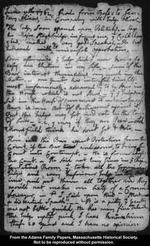
JUNE 5TH. 1762.
Rode from Bass's to Secretary Olivers, in Company with judge Oliver. The judge soon opened upon Politicks. Says he, Major Stockbridge informs me, that Coll. Ruggles makes a very good Speaker. He has behaved with to universal approbation.
Soon afterwards, the judge said, I never knew so easy an Election in my Life. Some of the Bar interest themselves, very much in the Matter. One Gentleman has interested himself most infamously, advanced that to be Law in the House which is not Law. -- That the judges cant set in the House of Commons is certain because there is an Act of Parliament against it. But the judges may set and vote in the House of Lords -- i.e. they may if they are Peers. Ld. Mansfield think he dont set and vote. -- How can the Bar expect Protection from the Court, if the Bar [illegible] endeavours to bring the Court into Contempt. He is forever abusing the Court. He said not long since in the Representatives Room, that take all the superiour judges and every Inferiour Judge in the Province, and put them all together and they would not make one half of a Common Lawyer.
I said upon this "That was a distracted Speech. It is a
pitty, that Gentleman was not better guided. He has many fine Talents." The Judge replyed quick, I have known him these 20 Years and I have no opinion
Page 2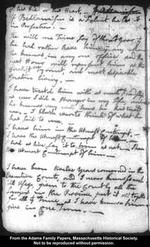
of his Head or his Heart.
If Bedlamism If Bedlamism is a Talent he has it in Perfection.
He will one Time say of the Lieutenant Governor, that he had rather have him than any Man he knows, in any one office, and the next Hour will represent him as the greatest Tyrant, and most despicable Creature living.
I have treated him with as much Friendship as ever I did a stranger in my Life, and he knows very well how he has treated me. I blush even to think of what he has said to me.
I have him in the Utmost Contempt. I have the Utmost Contempt of him. I had as live say it to him as not. I have the Utmost Contempt of him.
I have been twelve Years concerned in the Executive Courts, and I never knew so much ill Usage, given to the Court by all the Lawyers in the Province put it all together for all that Time, as I have known him give in one Term.
Page 3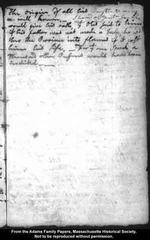
The origin of all his Bustle is very well known. I heard a Gentleman say he would give his oath, that Otis said to him if his father was not made a judge, he would thro the Province into flames if it cost him his Life. For that one Speech, a Thousand other Persons would have been indicted.
Page 4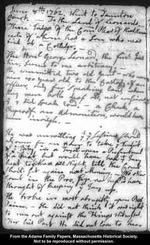
JUNE 8TH. 1762.
Went to Taunton Court. To the Land of Leonards. Three Judges of the Common Pleas of that Name, each of whom has a Son, who was bred at a Colledge.
The Honl. George Leonard, the first justice, seems to me arbitrary. He committed two old Gentlemen who were near 80 Years old, to the Custody of an officer, only for speaking loud, when they were both deaf and not conscious that they did speak loud. A Check, a Reproof, an Admonition, would have been enough.
He was unwilling that the sessions should adjourn for an Hour to take the Verdict of the Jury, in a Tryal upon a Presentment of a Riot, but would have had that jury kept together all Night, till the Court should set again next Morning. No other Court in the Province, Superiour nor Inferiour, would have thought of keeping that jury up.
He broke in most abruptly upon Bob Paine. He did not think it was right to run out against the Kings Witnesses. For his Part He did not love to hear
Page 5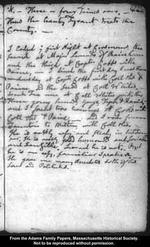
it. -- Three or four Times over-&c. Thus the hauty Tyrant treats the County.
I lodged the first Night at Corsmans [Crossmans], the second at Major Leonards of Rainham and the third at Captn. Cobbs with Paine. I dined the first day I was there wednesday at Captn. Cobb s with Coll. Otis and Paine, and the second at Coll. Whites. Drank Tea once at Coll. Whites with the three young Leonards, George, Zeph. and Daniel, and I spent two Evenings at Cobbs with Coll. Otis, and Paine. And I rode from Taunton to Milton, with Coll. Otis. He is vastly easy and steady in his Temper. He is vastly good humoured and sociable and sensible. Learned he is not. But he is an easy, familiar Speaker. He gave me many Anecdotes both of his Law and Politicks.
Page 6
Page 7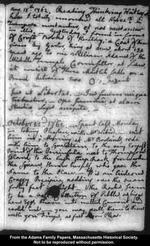
AUG. 15TH. 1762.
Reading, Thinking, Writing-have I totally renounced all three? Tempora mutantur, et nos mutamur in illis. Yesterday I found in some of Crafts Books of Heraldry, a Coat of Arms given by Garter, King at Arms, about 130 Years ago, to one William Adams of the Middle Temple, Counsellor at Law. It consists of Three Martlets sable, on a Bend between two O's-bezants.
Jus et Libertas. Jus suum cuique tribuatur. Ope summa, et alacri Studio, Leges accipite.
OCTOBER 22ND. 1762.
Spent last Monday in taking Pleasure, with Mr. Wibird. Met him in the Morning at Mr. Borlands, rode with him, to Squantum, to the very lowest Point of the Peninsula, next to Thompsons Island, to the high steep Rock, from where the Squaw threw herself, who gave the Name to the Place. It is an hideous Craggy Precipice, nodding over the Ocean forty feet in hight. The Rocks seem to be a vast Collection of Pebbles, as big as hens Eggs, thrown into melted Cement, and cooled in. You may pull them to Pieces with your Fingers, as fast as you Please.
Page 8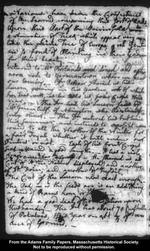
Various have been the Conjectures of the Learned, concerning this sort of Rocks. Upon this Part of the Peninsula, [illegible] is a Number of Trees, which appear very much like the Lime Tree, of Europe, which Gentlemen are so fond of Planting in their Gardens for their beauty.
Returned to Mr. Borlands, and dined, and after noon rode to Germantown, where we spent our Evening. Deacon Palmer shewed us his Lucern, growing in his Garden, and of which he has cutt, as he tells us, four Crops this Year. The Deacon had his Lucern seeds of Mr. Greenleaf, of Abington, who had his of judge Oliver. The Deacon watered his but twice this summer, and intends to expose it uncovered, to all the Weather of the Winter for a fair Tryal, whether it will endure our Winters or not. Each of his four Crops had attained a good Length. It has a rich fragrance for a Grass. He shewed us a Cut of it, in "Nature displayed," and another of St. Foin, and another of Trefoil. The Cut of the Lucern was exact enough. The Pod in which the seeds are is an odd Thing, a kind of Rams horn or [straw?].
We had a good deal of Conversation upon Husbandry. The Deacon has about 70 Bushells of Potatoes, this Year on about 1/4 of an Acre of Ground.
Page 9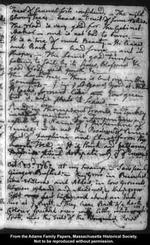
Trees of several sorts considered. The wild Cherry Tree. Bears a Fruit of some Value. The Wood is very good for the Cabinet-Maker, and is not bad to burn. It is a tree of much Beauty. Its leaves and Bark are handsome, and its shape. -- The Locust, good Timber, fattening to soil, by its Leaves, Blossoms &c. Good Wood, quick growth, &c. -- The Larch Tree. There is but one in the Country, that in the Lieutenant Governors Yard at Milton. It looks somewhat like an Evergreen but is not. Sheds its Leaves.
I read in Thompsons Travels, in Turkey in Asia, mention of a Turpentine called by the Name of the Turpentine of Venice, which is not the Produce of Venice but of Dauphine, and flows from the Larch Tree. It is thick and balsamic and used in several Arts, particularly that of Enameling.
OCTR. 23RD. 1762.
At my Swamp. Saw several Ginger Bushes. They Grow in Bunches like Willows and Alders, in low Grounds, between Upland and Meadows. They grow Eight
[illegible] feet high, and about an Inch
thro at the Butt. They have Bark of a dark
Colour, speckled over with little, white rough Spots, near the Ends of the
[illegible] Bows
[Boughs]
Page 10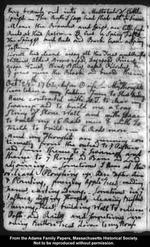
they branch out into a Multitude of little Sprigs. The Bush I saw had shed all its Leaves. All over the Branches and sprigs, are little fresh Buds at this season. It has a spicy Taste. The Spriggs and Buds and Bark have a spicy Taste.
Tirrell has cleared away all the Trees and Bushes, Willows, Alders, Arrow Wood, Dog Wood, Briars, Grape Vines, Elms, Ashes, Oaks, Birches, &c. that grew upon the Brook and burned them.
OCTR. 24TH. 1762.
Before
[sun] rise. My Thoughts have taken a
any sudden Turn to Husbandry. Have contracted with Jo. T
[Tirrell?] to clear my swamp and to build me a long string of stone Wall, and with Isaac
[Tirrell?] to build me 16 Rods more and with Jo Field to build me 6 Rods more. And my Thoughts are running continually from the orchard to the Pasture and from thence to the swamp, and thence to the House and Barn and Land adjoining. Sometimes I am at the orchard Ploughing up Acre after Acre and Planting, pruning Apple Trees, mending Fences, carting Dung. Sometimes in the Pasture, digging stones, clearing Bushes, Pruning Trees, building Wall to redeem Posts and Rails, and sometimes removing Button Trees down to my House.
Page 11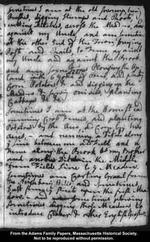
Sometimes I am at the old swamp, burning Bushes, digging stumps and Roots, cutting Ditches, across the Meadow, and against my Uncle, and am sometimes at the other End of the Town, buying Posts and Rails, to Fence against my Uncle and against the Brook, and am sometimes Ploughing the Upland, with 6 Yoke of oxen, and planting Corn, Potatoes, &c. and digging up the Meadow and sowing onions, planting cabbages &c. &c.
Sometimes I am at the Homestead running Cross Fences, and planting Potatoes by the Acre, and Corn by the two Acres, and running a Ditch along the Line between me and Field, and a Fence along the Brook [against] my Brother and another Ditch in the Middle from Fields Line to the Meadow. Sometimes am Carting Gravel from the Neighboring Hills, and am sometimes Dust from the streets upon the fresh Meadow. And sometimes plowing, sometimes digging those Meadows, to introduce Clover and other English Grasses
Page 12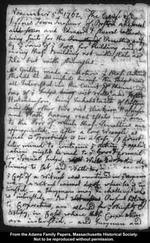
NOVEMBER 5TH. 1762.
The Cause of Jeffries Town Treasurer of Boston and Sewal and sever and Edwards and several others being suits for the Penalties of Penalties arising by the Law of the Province for building and covering those Building [s] not with slate nor Tile but with shingles.
Mr. Gridley made a Motion that those Actions should be dismissed because the judges were all Interested in the Event of them. Two of the judges vizt. being Wells and Foster Hutchinson, being Inhabitants of Boston, and the other two vizt. Eliakim Hutchinson and Watts, having real Estates in that Town, to the Poor of which those Penalties are appropriated. After a long Wrangle, as usual when Trowbridge is in a Case, the Court determined to continue the Action, that Application might be made to the Governor and Council for Special Judges. Well Wells and Foster declining to set, and Watts too.
The Case of a Witness was mentioned in the Argument. A Witness cannot depose, when he is interested. A Juryman may be challenged who is interested. But
[illegible] Persons belonging to Corporations, are allowed for the Necessity to testify, in Cases where those Corporations are interested. And Jurymen and
Page 13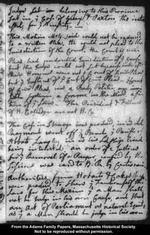
judges
[illegible] belonging to this Province sat in the Case of Gray and Paxton,
tho interested, for the Necessity.
This Motion Mr. G. said could not be reduced to a Written Plea. He could not plead to the jurisdiction of the Court. The Court of Common Pleas had undoubted jurisdiction of the Cause but the judges could not set because interested. Their Honours were not the Court of Common Pleas but the justices of the Court of Common Pleas. The Court of Common Pleas was a Body Politic, an invisible system, a frame in the Mind, a fiction of the Law. The President and Fellows of H. [Harvard] Colledge are not H.C.
The Case in Strange was produced, in which Ld. Raymond went off the Bench, the Parish of Abbots Langley in which his Lordship lived being interested. An order of 2 Justices for the Removal of a Pauper, confined by the Sessions was carried to B.R. [Bancus Regis or King's Bench] by Certiorari.
Authorities from Hobarts and Cokes Rep.
[Reports] were produced, to
shew the Tenderness of the Law for this Maxim that a Man shall not be judge in his own Cause, and that an Act of Parliament
vs. natural Equity as that a Man should be judge in his own
Page 14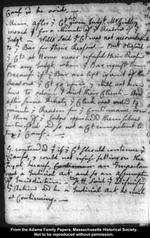
Cause would be void.
Mem. After the Court had given judgment Mr. Gridley moved for a Minute of the Reasons of the Judgment. Wells said the Court was not accountable to the Bar for their Reasons. But Otis said the Courts at Home never refused their Reasons for any judgment when the Bar requested them. Because if the Bar are left ignorant of the Reasons the Court go upon, they will not know how to advise and direct their Clients. And after some Debate, the Clerk was ordered to minute the Reason for the Continuance, which was that three of the judges apprehended themselves interested and so not a Court competent to try the Cause.
G. contended that if the Court should continue the Causes, they could not refuse setting on the Tryal, because, continuin? an Imparlance was a Judicial Act, and so an Assumption of Jurisdiction. F. [Foster ] H. [Hutchinson] said that Dismissing the Actions would be a judicial Act, as much as Continuing.
Page 15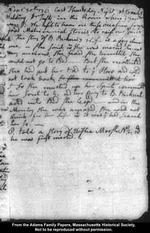
NOVR. 30TH. 1762.
Last Thurdsday Night, at Cranch's Wedding, Dr. Tufts, in the Room where the Gentlemen were, said We used to have on these Occasions, some good Matrimonial stories, to raise our spirits. The story of B. Bicknal's Wife is a very clever one. She said, when she was married she was very anxious, she feared, she trembled, she could not go to Bed. But she recollected she had put her Hand to the Plow and could not look back, so she committed her so she mustered up her Spirits, committed her soul to G. [God] and her Body to B. Bicknal and into Bed she leaped and in the Morning she was amazed, she could not think for her Life what it was that had scared her so.
P. [could be either Robert Treat Paine or, less likely, Joseph Palmer ] told a story of Elisha Marsh No. 2. when he was first married.
Page 16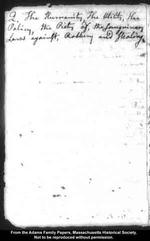
Q. [Quere] The Humanity, The Utility, the Policy, the Piety of the sanguinary Laws against Robbery and Stealing.
Page 17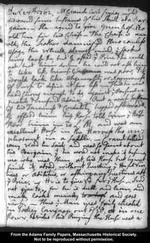
DECR. 28TH. 1762.
Mr. Cranch last
fryday night discovered some Instances of his skill at a Bargain. He agreed to give Greenleaf 120 old Ten
[Tenor] for his Chaise. The Chaise is old, the Leather damnifyed
thro careless Usage, the Wheels almost ruined, the spokes being loose &c., but G. asked that Price and he could not beat him down, he could not ask him to take less, because G.
[illegible] was poor, and it would look like Ungenerosity or Narrowness of Purse to desire it for less. This he was headstrong enough to do, against the Parsons repeated and enforced Advice. But a worse Instance of his Tameness and Credulity happened afterwards. G. offered him his Horse, told him the Horse stood him in 10 L.
[Lawful] M.
[Money] and was an excellent Horse in the Harness
tho unpleasant in a saddle. Cranch believed every Word he said, and was so secret about his Bargain, that he would not make it before me, who was then at his House but he must finish it, abroad, without Questioning the Horses Virtues or Abilities, or asking any Questions about the Price. He is to give 50 for the Horse. I would not give .10, for he is dull and lean, and weak, looks meanly
[illegible] and goes worse. -- Thus the Man was fairly cheated in jockey language Out Of 50, in one Hour. Besides his Buying the Horse was a
Page 18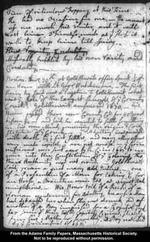
Piece of ridiculous Foppery, at this Time. He had no Occasion for one. He cannot use one much this Winter, and it will cost him 3 Times so much as that Horse is worth to keep him till spring.
Thus Vanity, Credulity,
Miserably bubbled by his own Vanity and Credulity.
BOSTON. DECR. 30TH.
At Goldthwaits office, spent 1 /4. of an Hour with Lt. Govr. Hutchinson. The first thing he said was a Question to Goldthwait, what was the Date of the Earlyest Records of the County Court? Goldthwait answered 1670. His Honor replyed there were County Courts for 40 Years before that -- and said he wanted to settle something in his own Mind, concerning the origin and Constitution of the Courts. That Adultery was punished with death, by the first settlers, and many other offences were made capital, that are not now so. That Commissioners were sent over by K. [King] C. [Charles] in 1665, to enquire into the Constitution of the Colonies, tho their Authority was not owned. Goldthwait said, there were a great many odd Entries. One of a Prosecution of a Man for taking 6d. for an Horse, a Braintree man too, as unjust and unrighteous. His Honor told of a Record of a Woman condemned, for Adultery, because a Man had debauched her when she was drunk, and of another of a Boy imprisoned for a Capital Tryal for some of their trifling capital Crimes, stealing from his Master or something, which Boy was liberated by the Commissioners of 1665.
Page 19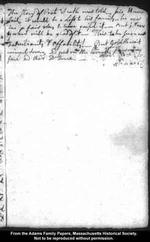
The story of Prats Death was told. His Honor said it would be a Loss to his family. He was in a fair Way to have raised it. But the New Yorkers will be glad of it. -- This to be sure was Familiarity and Affability! But Goldthwait cringed down, and put on the timid, fawning face and Air and Tone.
Pages 20 - 26
[Blank pages -- no images available]
Inside Back Cover
[Blank page -- no image available]
Back Cover
[Blank page -- no image available]


















